|
|
|
Sort Order |
|
|
|
Items / Page
|
|
|
|
|
|
|
| Srl | Item |
| 1 |
ID:
165924
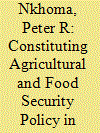

|
|
|
|
|
| Summary/Abstract |
Political economy analyses of agricultural and food security policies in Malawi have emphasized the role played by domestic politics and, more specifically, the centralization of power in the executive. This paper builds on this perspective by exploring the view that such policies are in fact negotiated outcomes of interactions at the state–donor interface. Using interview data gathered from expert key informants and a review of publicly available data, the paper explores how certain policy drivers have interacted to shape agricultural and food security policies in Malawi. The results reveal that policy processes in the recent past have been driven and mediated by fiscal considerations, sociopolitical pressures, and pragmatism, which accounts for the unique and complex peculiarities of the Malawi context.
|
|
|
|
|
|
|
|
|
|
|
|
|
|
|
|
| 2 |
ID:
140760
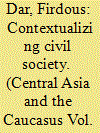

|
|
|
|
|
| Summary/Abstract |
The idea of “civil society” has achieved prominence in political and developmental discourse over the past two decades, particularly in connection with the successive waves of democratization, beginning in Latin America and Eastern Europe and spreading across the developing world. Civil society is an arena where, through free and civilized interaction and communication, individuals obtain and exercise their freedom, as well as pursue their interests. It is a space where people are given an opportunity to enter into social relations free from state interference. The fall of the U.S.S.R. has fundamentally altered the conditions for the emergence of civil society on a global level. The changed political map of Central Asia in general and Kyrgyzstan in particular has made it possible to carry out democratic reforms and, within this political context, various autonomous social organizations have emerged and begun creating their space in the political system. During the past two decades, open political regimes have been providing a more appropriate context within which civil societies are able to thrive. Such systems have provided a legal and regulatory framework guaranteeing the rights of social groups; they permit the existence of lively media, enabling social organizations to communicate their values and programs; and their political elites are acting in ways that reinforce the acceptance of social diversity and political differences. In this context, the present article is an attempt to shed some light on the different models of civil society emerging in the context of Kyrgyzstan.
|
|
|
|
|
|
|
|
|
|
|
|
|
|
|
|
| 3 |
ID:
142624
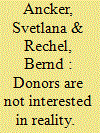

|
|
|
|
|
| Summary/Abstract |
This article explores the interplay between international donors and local NGOs in Kyrgyzstan's HIV/AIDS sector. It argues that donors have transposed ready-made policies without sufficient consideration of the local context and that NGOs have responded strategically, adapting their proposals and reports to the expectations of donors. This complex interplay has resulted in unintended consequences that have undermined an effective response to the HIV/AIDS epidemic. It has given rise to ‘virtual realities’ detached from developments on the ground. The funding system has also led to corruption and misappropriation of funds and the failure of NGOs to become sustainable. Largely bypassing the state in the allocation of funds, international donors have also undermined an already weak state.
|
|
|
|
|
|
|
|
|
|
|
|
|
|
|
|
| 4 |
ID:
158645


|
|
|
|
|
| Summary/Abstract |
In the Democratic Republic of Congo, donors promoted rapid liberalisation and presidential elections in the aftermath of the war, and after two terms, President Kabila has not left office. This article engages with the question of how liberalisation and elections are connected, and how they are related to the extension of presidential power. It finds that the international market for minerals has shaped the domestic political economy but its nature has effectively been ignored in the formulation of donor policy; efforts at regulating trade have been concentrated on due diligence of origin in Congo but have not addressed the secrecy of international trade. Liberalisation has removed control of economic resources from Congo, provided returns for elite politicians and funded violence to control the disenfranchised population. The offshore companies are the elephant in the room; without acknowledging them, analysis of the liberalisation and its interaction with presidential tenure lacks assessment of the opportunities, interests and power that shaped the processes.
|
|
|
|
|
|
|
|
|
|
|
|
|
|
|
|
| 5 |
ID:
155794


|
|
|
|
|
| Summary/Abstract |
Drawing on 70 interviews with civil society staff in Malawi, I argue that when development trends and issues in the country change, at donors’ wishes, organizations proactively strategize to vie for donor funds. Collected over three research trips, my data show that between 2008 and 2010 there was a widespread belief among civil society in Malawi that climate change was becoming the “it” issue, surpassing HIV/AIDS in predominance. Alongside this belief, there was a dynamic, if invisible, process of organizational repositioning. Comparing the earlier interviews with those conducted in 2014, I contend that the issues of focus, while interesting, are less telling than the ways Malawian organizations endeavor to adapt and respond to them. This paper adds a critical dimension to development literature, investigating a process that occurs when development agendas change.
|
|
|
|
|
|
|
|
|
|
|
|
|
|
|
|
| 6 |
ID:
188237
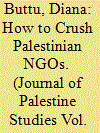

|
|
|
|
|
| Summary/Abstract |
Israel has long sought to erase Palestinians, Palestinian resistance, and Palestinian organizations. In Israel’s latest rendition of erasure, Palestinian nongovernmental organizations (NGOs) have become the new target. By labeling NGO staff, and now NGOs, as “terror-affiliated,” Israel is attempting to silence these organizations by making it impossible for them to be funded. Looking at the case of Mohammed El Halabi from World Vision, one can see that it does not take much for donors to run scared: just using the “t” word is sufficient, with no need for evidence.
|
|
|
|
|
|
|
|
|
|
|
|
|
|
|
|
| 7 |
ID:
103649
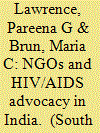

|
|
|
|
|
| Publication |
2011.
|
| Summary/Abstract |
India has the second-largest population living with HIV/AIDS in the world. Although the exact number of HIV positive people is contested, it is predicted that the current numbers are likely to grow at a rapid rate in the next decade if the epidemic goes unchecked. This paper explores the HIV/AIDS epidemic in India through the perspective of two non-governmental organisations (NGOs) whose roles have become critical in the fight against the disease. Specifically, it identifies the challenges faced by these NGOs such as lack of government responsiveness, funding-related problems, corruption, donor accountability, and cultural attitudes to HIV/AIDS, while exploring the theoretical implications of NGOs playing a greater role in providing programming and services to those living with, and affected by, the epidemic.
|
|
|
|
|
|
|
|
|
|
|
|
|
|
|
|
| 8 |
ID:
091954
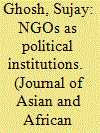

|
|
|
|
|
| Publication |
2009.
|
| Summary/Abstract |
Institutions are essentially broadly agreed norms, rules and routines. They might have arisen out of social conflicts with strong influence of power relations, but they also face the demands of democracy. While studying NGOs as political institutions, particularly in the context of a number of developing countries, this article argues that the political context of their action is determined by their relationship with the donors and social movements. Second, NGOs promote democracy when they redefine participation in terms of their relationship with state and society; and contribute to improve the quality of participation, although with much less success in promoting internal democracy.
|
|
|
|
|
|
|
|
|
|
|
|
|
|
|
|
| 9 |
ID:
157782
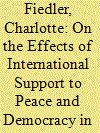

|
|
|
|
|
| Summary/Abstract |
This article shows that the international community can have a decisive impact on peace and democracy in a country, based on a paired comparison of Kenya and Kyrgyzstan. Both countries have experienced similar political trajectories, amongst them a struggle to consolidate peace and democracy after outbreaks of major interethnic violence, but show varying degrees of international influence on these processes. Analyzing several critical junctures in the two countries’ peace and democratization process through over 80 interviews reveals that although crucial international impact is rare, it is possible if donors jointly pursue a political agenda that connects to a home-grown process.
|
|
|
|
|
|
|
|
|
|
|
|
|
|
|
|
| 10 |
ID:
182857
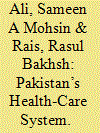

|
|
|
|
|
| Summary/Abstract |
Pakistan currently ranks 154 out of 189 countries on the UNDP’s Human Development Index. In this paper, we use a ‘political settlements analysis’ to understand how the distribution of political, economic and social power explains this ranking and the inequity in Pakistan’s health system. We investigate elite power struggles over the last seven decades to explain how ad hoc policy-making, instability, patronage politics and rent-seeking have led to a maldistribution of resources, lack of oversight, and inequitable access and service provision for a burgeoning population. We argue that these factors have had two consequences: the privatisation of health care, and the opening up of a considerable sphere of influence to the donor community to direct state policy. Despite promising ongoing reform efforts, we conclude that Pakistan’s health system will remain hamstrung by the constraints of a political settlement in which elites with short-term horizons bargain for influence rather than developing an inclusive, consensus-based approach to improving governance outcomes for citizens.
|
|
|
|
|
|
|
|
|
|
|
|
|
|
|
|
| 11 |
ID:
171023
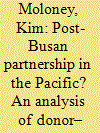

|
|
|
|
|
| Summary/Abstract |
This paper explores the possibility of a partnership between foreign aid donors and South Pacific NGOs. This partnership focus emerged out of the 2011 Busan Outcome Document. Drawing on 51 interviews of donors and Pacific-created NGOs in four countries (Fiji, Samoa, Solomon Islands, and Vanuatu), this paper finds limited donor–NGO partnership. Reasons include insufficient donor interest in a partnership, capacity and accountability concerns for Pacific NGOs, and scarce core funding. While global agreements to encourage partnership are important components of development effectiveness discussions, donor–NGO partnership is not yet possible within the Pacific context.
|
|
|
|
|
|
|
|
|
|
|
|
|
|
|
|
| 12 |
ID:
151247
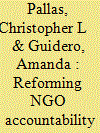

|
|
|
|
|
| Summary/Abstract |
Proposed solutions to INGO accountability problems frequently conflict. Dominant scholarship focuses on promoting self-regulation within the INGO community, while an alternative body of literature focuses on generating external incentives for accountability, using state/IO regulations or conditional funding. This article analyzes the causes and implications of this disjuncture. We first show that self-reform requires a high degree of INGO autonomy, whereas external reform requires a high degree of donor control. We next conceptualize INGO autonomy as a price funders pay for INGO services. Using this framework, we show that INGO self-reform implicitly assumes that the demand for INGO services outstrips the supply (scarce supply), forcing funders to pay a high price in terms of INGO autonomy. Proposals for external incentives assume the opposite (abundant supply), such that competition among INGOs effects a downward pressure on autonomy, increasing donor control. These findings reveal that solutions to NGO accountability cannot be an “all of the above” proposition. Moreover, because demand for services may vary between sectors of NGO activity, effective solutions need to be sector-specific, rather than universal.
|
|
|
|
|
|
|
|
|
|
|
|
|
|
|
|
| 13 |
ID:
119120
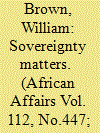

|
|
|
|
|
| Publication |
2013.
|
| Summary/Abstract |
This article critiques the predominant opinion that aid undermines the sovereignty of African states. This claim implies not only that a recipient state's policy autonomy is curtailed by development assistance, but also more fundamentally that the politico-legal independence of the state itself is being challenged. While the former is often the case, the latter is not. Drawing a conceptual and analytical distinction between sovereignty as a right to rule and national control over policy and outcomes, the article develops a more accurate identification of the areas in which aid, as a particular form of external influence, does and does not have an impact on recipient states. It argues that sovereignty as a right to rule constitutes the very basis of the aid relationship, and endows African states with the agency with which to contest the terms of aid deals. The article thus provides a new reading of the politics of aid and, by reasserting the centrality of sovereignty as an organizing institution in contemporary aid relations, supports rather than questions the relevance of the discipline of International Relations to African studies.
|
|
|
|
|
|
|
|
|
|
|
|
|
|
|
|
| 14 |
ID:
156712
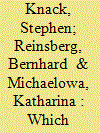

|
|
|
|
|
| Summary/Abstract |
The rapid growth of trust funds at multilateral development organizations has been widely neglected in the academic literature. We examine sovereign donors' choices among various trust fund options and contend that the choice among the different trust funds involves a fundamental trade-off: larger funds provide donors with “burden-sharing” benefits, but each donor can better assert its individual preferences in a fund with fewer other donors. The theoretical considerations yield testable hypotheses on a range of factors affecting this fundamental trade-off, most notably the area of the trust fund's intervention and donor countries' competing domestic interests. A large-N analysis of participation decisions of OECD/DAC donors in trust funds over the past decade mostly corroborates these hypotheses. In particular, ex ante preference alignment among donors as well as indicators for global activities and fragile states aid are robust determinants of participation in (large) multi-donor funds. In contrast, a donor tends to prefer a single-donor fund in areas where its national interests dominate.
|
|
|
|
|
|
|
|
|
|
|
|
|
|
|
|
|
|
|
|
|